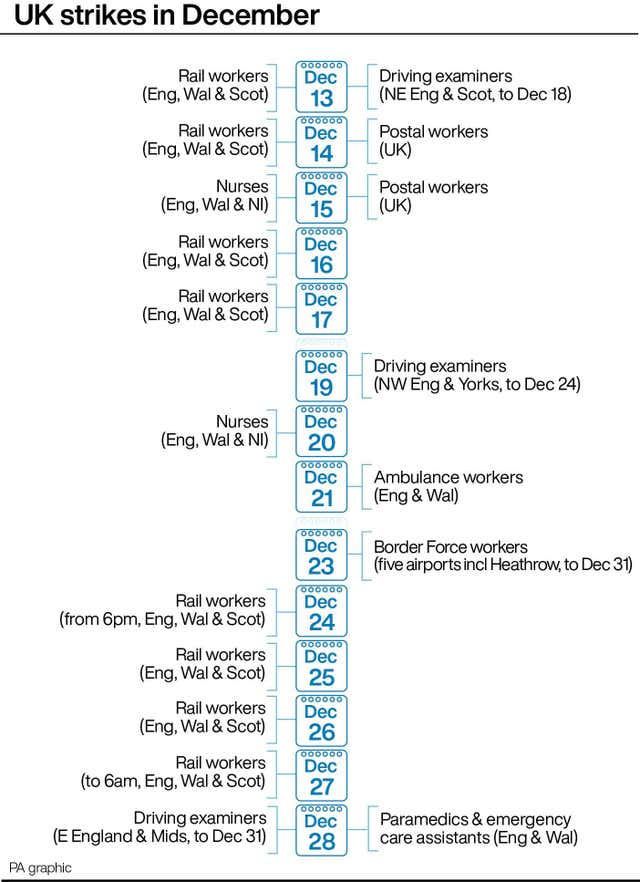
Commuters face a second day of severe rail disruption on Wednesday as members of the Rail, Maritime and Transport union (RMT) are joined in walkouts by Royal Mail workers, and nurses prepare to take unprecedented industrial action.
As on the first day of the 48-hour strike, around half of Britain’s rail lines will be closed all day, as thousands of members at Network Rail and 14 train operating companies walk out in the long-running dispute over pay, jobs and conditions.
Most parts of Wales will have no services.
 (PA Graphics)
(PA Graphics)
Postal workers in the Communication Workers Union (CWU) will stage a fresh 48-hour national walkout on Wednesday, their third of six days of strikes in the run-up to Christmas.
Royal Mail has brought forward the final posting dates for Christmas cards to December 16 for first class mail, and December 21 for special delivery guaranteed.
Nurses in Wales are due to start strike action in a row over pay on Thursday after talks with the Government broke down.
The wave of industrial action is growing, with physiotherapists in Wales voting to strike in their first ever ballot on pay. The action is expected to take place early in the new year.
"We are short-staffed, overworked, exhausted," said Jill Taylor, a physiotherapist and chair of the Chartered Society of Physiotherapy's pay committee.
"We need to attract people to the NHS and we need to keep people in the NHS. We simply cannot do this until the government gives NHS staff a fairer pay award."
Meanwhile midwives and maternity support workers in Wales who are members of the Royal College of Midwives have also voted to go on strike over pay.
In Wales, 55% of Royal College of Midwives (RCM) members responded to the ballot, with 91% voting in favour of strike action.
Julie Richards, director for Wales at the RCM, said: "Midwives in Wales are exhausted. The disappointing and unacceptable 4% pay offer simply reinforced their feelings of being overlooked and undervalued."
She added: "Taking industrial action is always a last resort, and the decision taken by our members today shows just how desperate they are for policy makers to listen.
"The Welsh Government must now do so to get maternity services in Wales back on track, and to stop the inevitable exodus of demoralised staff."
A spokesman for the Welsh Government said it recognises the "anger and disappointment" felt by public sector workers.
"We are unable to increase our pay offer without additional funding being made available by the UK government," he said.
"NHS Wales organisations are exploring all options to ensure there will be a safe level of staffing, with life-saving and life-maintaining care being provided during any industrial action."


Comments: Our rules
We want our comments to be a lively and valuable part of our community - a place where readers can debate and engage with the most important local issues. The ability to comment on our stories is a privilege, not a right, however, and that privilege may be withdrawn if it is abused or misused.
Please report any comments that break our rules.
Read the rules here